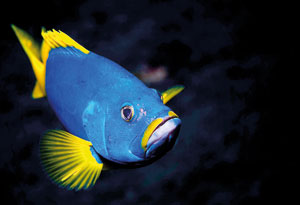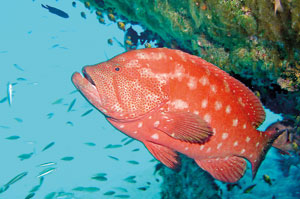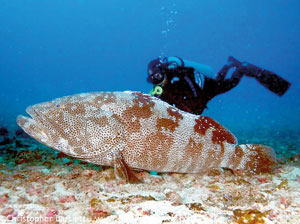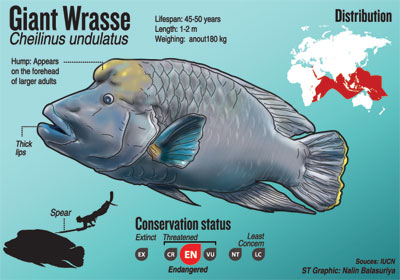News
Humphead wrasse killing stirs calls for protection and spearfishing ban

Blue and Yellow Grouper
Declare the endangered humphead wrasse as a protected species in Sri Lanka and ban spearfishing, researchers of aquatic resources, diving groups and conservationists demand.
An environment lawyer says spearfishing can be banned under existing laws.
Outrage grew after pictures emerged showing a human-sized humphead wrasse, (cheilinus undulates) also known as Napoleon wrasse, being hauled ashore after being killed. This fish, with its thick lips and a hump on its head, is listed as endangered by the International Union for Conservation of Nature. It is also regarded as a delicacy by the Chinese especially in Hong Kong where it fetches upwards of Rs 45,000 a kilo. This coral reef fish must be in demand in Chinese restaurants in the island as well.
The fish can grow up to six feet and can weigh up to 190 kilograms. It can live up to 30 years, but many are killed before they reach maturity.
Humphead wrasse is a popular target of spear fishermen.
In Unawatuna, a dive centre that mainly caters to Russians is allowing spearfishing which destroys many large marine species, marine activists say.
“In the case of the Unawatuna incident, the fish was speared outside the protected area and the law doesn’t ban hunting of humphead wrasse. So, we are unable to take any action against them,” said Channa Suraweera of the Department of Wildlife Conservation. He oversees marine affairs.
While hunting of wild animals on land is illegal, fish is treated as a food source, irrespective of the threat levels various fish species face.
Dr Sisira Haputantri of the National Aquatic Resources Research and Development Agency said the agency will be recommending to the Fisheries Department that the humphead wrasse be made a protected species. But that will only be a start as monitoring whether the fish is being hunted is difficult.
Large coral fish such as the humphead wrass are threatened in other areas of the island as well.

Tomato Grouper
In 2013, the Sunday Times exposed the danger to the humphead wrasse particularly in Kalpitiya area where divers who dive for chank and sea cucumber also target the giant fish. They kill the fish even if it takes cover in underwater caves.
In times past, free divers engaged in spearfishing. They can stay underwater only for a limited time. But scuba gear allows divers to continue spear fishing for longer. “Scuba gear allows a diver to stay under water for long periods and chase a target fish. Most of the mature humphead wrasse in our reefs have already been hunted and large specimens such as the one that had been speared in Unawatuna are rare. Only a handful of individual fish that flee at the sight of a diver are survivors,’’ said researcher Arjan Rajasuriya, Coordinator, Coastal & Marine Programme IUCN Sri Lanka.
Dr Malik Fernando, who is a founder member of the Sri Lanka Sub-Aqua Club, a diving club, recalls how wild animals once heavily hunted in colonial times, have become a source of pride and joy in the island once they are protected.
“The land animals once hunted by a few brought wonder and joy to many, such as those who ventured into wild places and protected areas in search of them. Visiting wildlife parks became a major recreational activity and a source of income for the Government. What we are proposing for the marine environment is an extension of what has been done on land: the conservation of a threatened group of animals (fishes) that would otherwise likely disappear from our waters,” Dr Fernando writes in an appeal.
The Sri Lanka Sub-Aqua Club sent the appeal to the Minister of Fisheries in May 2015 outlining reasons for a ban on spearfishing.
“This proposal would certainly inconvenience a few people. But we are confident that those who would be affected do not depend exclusively on spearing fish or renting spear fishing equipment for their existence. Like the hunters in days gone by, they will learn to live with the new rules. The result will be that the seas around Sri Lanka will once more be home to really large giant groupers and family groups of the humphead wrasse,” he observes.

Giant Grouper
“Removal of large coral fish could be detrimental to the whole coral ecosystem affecting other species as well. For example, the humphead wrasse feed on crown-of-thorn starfish that destroys coral reefs,’’ said marine researcher Rajasuriya. Also large fish such as the tomato grouper help maintain the holes in low relief reefs where the scarlet shrimp and painted shrimp take shelter. These shrimps are high value items in the ornamental fish trade and without the large fish the shrimp populations would die out and adversely impact the sustainability of the business.
The Sub-Aqua Club has appealed to the Minister of Fisheries to protect 15 large coral fish.
Environment lawyer Jagath Gunawardane said spearfishing can be banned under the Fisheries and Aquatic Resources Act section 28, listing the equipment under the illegal gear.
The marine experts also highlight the importance of banning illegal fishing practices such as dynamiting and bottom trawling.


